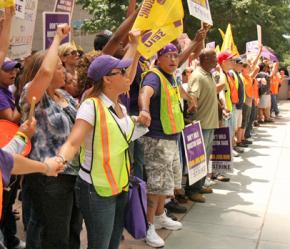Janitors back down bosses
reports on the agreement reached for Houston janitors--who reached out for support around the country during their strike.
HOUSTON JANITORS ended their month-long strike on August 11, forcing contractors to agree to several important concessions and scoring a victory against business as usual in the right-to-work state of Texas.
The agreement, which members voted to ratify on August 11, provides for a $1 an hour increase in hourly wages, from $8.35 to $9.35, over the next four years. Although this is less than the $1.65 an hour raise to $10 that the union originally wanted, it's double the company's initial "final offer" of a 50 cents an hour hike.
"Today, we proved that when workers join together, we have strength," said Adriana Vasquez, a bargaining committee member and janitor who works for ISS at Chase Tower, in a statement release by the union. "This is a huge victory for janitors and so many workers. With this new contract, our families can live a little better."
Given the context in which the janitors were striking--a right-to-work state where labor victories are rare, and with only six years of union representation under their belt--this marks an inspiring victory. But the 3,200 members of Service Employees International Union (SEIU) Local 1 earned the win with their determined struggle.

The janitors work for low wages cleaning the offices of some of the most profitable companies in the U.S., such as JPMorgan Chase and Shell Oil. The union's first contract was negotiated in 2006 after a strike.
When the 2009 contract expired in May, members organized several shorter work actions, leading up to an all-out strike beginning on July 10. The union reached out for support for their struggle, not just in Houston but nationally--and that call for solidarity was answered enthusiastically. Activists around the country organized protests, solidarity strikes and civil disobedience in support of the janitors.
The strike ended August 8, when negotiators announce a tentative agreement with most of the major cleaning contractors. Some 500 workers turned out a few days later to unanimously ratify the contract, according to SEIU officials.
Another key component of the agreement is that the union and contractors reached a compromise over contentious contract language that would have allowed contractors to bid for some cleaning accounts at rates below those stipulated in the contract.
According to the compromise, contractors can bid at a lower rate based on "geography" and "the size of the building" only at places specified in the contract. SEIU officials say they will be able to maintain union standards in places where they have the most members, while contractors will be able to expand cheaply into new areas.
THE JANITORS' struggle was an uphill battle in a state like Texas, where the union membership rate was 5.4 percent as of 2011, compared with 11.8 percent in the rest of country.
Texas is a right-to-work state, which means an employee of a unionized workplace can opt out of the union and paying union dues. For the minority of workers who are organized in unions, right- to-work laws make actions like this strike very difficult.
That the Houston janitors were able to stay strong on the picket line is a testament to their courage and determination. That they could win much of what they were asking for is even more remarkable.
The message of the janitors' struggle--that workers who labor at poverty wages in the buildings of some of the richest corporations in the world were prepared to stand up for decent wages--resonated with workers across the country.
And it had a hearing in Texas. Union officials point out that while only about 40 percent of workers chose to be dues-paying members of the union by the time the strike started, more decided to join the union in the course of the walkout, reported In These Times.
The future of the labor movement in Texas will have the fight anti-worker laws that hold back the labor movement. But this strike points a way forward for all workers--not only in the gains it achieved, but in the courage and solidarity shown by janitors, union organizers and community members over the past few months.
As Cindy Casares pointed out in the Texas Observer:
With the advent of the immigration reform and Occupy movements, Texas' traditionally lowest-paid workers may be realizing their situation doesn't have to remain the way it is. There is a support system if they seek it.
Last week, janitors and human rights activists in Atlanta, Boston, Chicago, Denver, Detroit, Indianapolis, Kansas City, Los Angeles, Milwaukee, New York City, Portland, San Diego, San Ramon, Seattle, St. Louis, Toronto and Washington, D.C., protested in solidarity with those in Houston.
Texas Observer reporter Emily DePrang described the scene on August 2 from Houston, where members of the janitors' union had gathered in front of the city's swankiest mall, the Galleria, to demonstrate: "The crowd was largely middle-aged and Hispanic, with lined faces, more women than men, some with children in tow. They were people with something to lose."
These are the people the other unions failed to organize, and they now represent the new face of Texas.
Workers everywhere can take inspiration from Houston janitors' determination to stand up to some of the most powerful corporations in the U.S. and show what being in a union is be all about.


